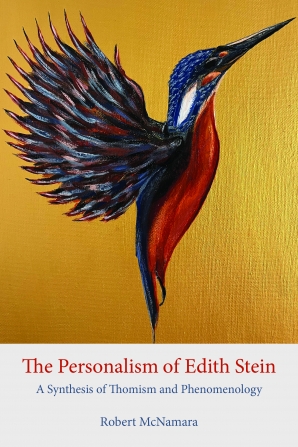- Home
- STUDIES IN THE CARMELITE TRADITION
- religion
- philosophy
- The Personalism of Edith Stein
Preparing your PDF for download...
There was a problem with your download, please contact the server administrator.
The Personalism of Edith Stein
A Synthesis of Thomism and Phenomenology
STUDIES IN THE CARMELITE TRADITION
Imprint: Catholic University of America Press
Edith Stein’s life and thought intersect with many important movements of life and thought in the twentieth century. Through her life and eventual martyrdom, she gave witness to the primacy of truth and faith in the face of political totalitarianism, and in her philosophical works, she contributed to a synthesis of phenomenological thought with the thought of Aquinas, while also progressively advancing a compelling form of philosophical personalism. As a result, Stein represents one of the most important Catholic thinkers of the twentieth century and is a figure of growing fascination and devotion among believers and nonbelievers alike.
The Personalism of Edith Stein is an investigation of Stein’s mature philosophical anthropology, exploring her engagement with the thought of Aquinas and Thomism while maintaining the phenomenological mode of investigation. Through a careful examination of Stein’s later works under the themes of human nature, the human individual, and the human being’s relation to God, McNamara shows that Stein’s mature personalism is considerably expanded and substantiated by her assimilation of key anthropological and metaphysical teachings of Aquinas and Thomism, and, conversely, that Stein significantly develops and deepens these same teachings through a phenomenological reconsideration of each from a personalist perspective.
As a whole, the study reveals the profound accord between Stein’s mature thought and the received teachings of Aquinas, while yet carefully attending to the remaining differences between them. Ultimately, the author proposes that Stein imbues the teachings of Aquinas with a fundamental personalization such that her mature anthropology can be understood as a Thomistically informed personalism that represents a significant, original contribution to the anthropological dimension of the philosophia perennis.
Robert McNamara is associate professor of philosophy at Franciscan University of Steubenville, associate series editor of Edith Stein Studies, associate scholar of the Hildebrand Project, associate member of faculty at the Maryvale Institute, and founding member of the Aquinas Institute of Ireland.
"Makes an excellent contribution to Stein studies by 1) offering a comprehensive overview and detailed analysis of Stein's anthropology, 2) comparing and contrasting Stein's thought with parallel themes in Thomism, and 3) highlighting the development of Stein's positions through the phases of her writing. McNamara helps move Stein studies forward by synthesizing the textual analyses with a synoptic vision of her project, while also advancing the reception of Stein among Thomists through an irenic and positive comparison."
~Thomas Gricoski, OSB, author of Being Unfolded: Edith Stein on the Meaning of Being
"The qualities of this work are many. It represents well-informed and personally assimilated scholarship which succeeds in presenting Stein’s work both compellingly and convincingly. For readers interested in understanding Stein’s synthesis of Phenomenology and Thomism, it will likely be the go-to work of this generation, and it might in that capacity catalyse new dialogues about the nature of Christian philosophy, phenomenological anthropology, and the relationship between modern and classical philosophy. It will serve as an introduction for the newcomer and as a challenge for the scholar."
~Mette Lebech, Maynooth University
"Although focused on Stein’s mature work on the person in her later writings, Robert McNamara presents a holistic picture of Stein’s thought on the person and provides a nuanced account of how Stein interacts with Thomistic personalism. McNamara is sensitive to points of commonality and difference between these two great Christian thinkers and sensitively takes on some of the more contentious questions, such as the relation of Stein’s phenomenology to metaphysics and her critique of Thomas on individuality. McNamara paints a picture of Stein as dynamically engaging with a living Thomism. Always sure-footed, nuanced, and engaging—one could not look for a better guide to this deeply important topic."
~Sarah Borden Sharkey, Wheaton College
"Robert McNamara’s The Personalism of Edith Stein is a significant contribution to the literature on St. Edith Stein. McNamara is extraordinarily well-versed in the Thomistic tradition, as well as in Stein’s phenomenological and personalist tradition. As a result, he is able to show how Stein confirmed and significantly deepened many claims of Thomistic anthropology and metaphysics. This is the ideal text for Thomists who want to understand the philosophy of St. Edith Stein. It is not just a remarkably rigorous work of philosophical scholarship, but also a deeply inspiring call to self-transcendence and to a deeper love for truth and goodness."
~Mark Spencer, author of The Irreducibility of the Human Person: A Catholic Synthesis
"In The Personalism of Edith Stein Robert McNamara has offered a service to contemporary readers. He shows that Thomas’s scholastic approach to the person can be accommodated within Edith Stein’s own phenomenological leanings, and what we are left with is an understanding of the person that speaks to followers of both Aquinas and Stein alike. McNamara is to be commended for his scholarship, his clarity of presentation, and for his courage and tenacity in both undertaking and completing such a project."
~Gaven Kerr, author of Aquinas and the Metaphysics of Creation

